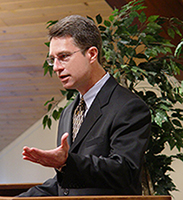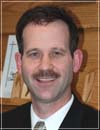The following is a lightly edited transcript of a sermon delivered on Monday morning, October 15th, 2011 during the annual pastors’ conference at Trinity Baptist Church in Montville, NJ. This is the opening session and the preacher is Pastor Dave Chanski.
I will say something, as I begin here, about the theme of this year’s conference. It is the law of God. We have the quote from Psalm 119, “I love your law,” on the cover of our conference brochure, and this really began (this, what led to our having the whole theme of the conference on the law of God) with a suggestion that I made sometime last year, I believe, when we began to talk about what should we do for next year’s conference and I suggested that we at least have a message on the subject of antinomianism.
I said that because I think there’s a sense in which I see an Antinomian behind every bush. I kind of feel like John Gill. Spurgeon, I think, wrote about John Gill, that he saw an Arminian behind every bush, and I don’t think the Arminians were always there were Gill saw them, but I think I do see an Antinomian almost behind every bush.
It’s a subject that I’ve been concerned about over the years and so I brought this up for discussion with my fellow elders. We discussed it a little bit and then we continued the discussion when a couple of the brethren who are here with us from NJ also drove with us, three elders from Trinity, out to a pastor’s fraternal in Grand Rapids Michigan back in—I think it was March (either that or April) of this year.
And then while we were driving I had said to the men, “Well, why don’t we have further discussion about the subject for next year’s conference and we could even get the input of these other brethren.”




